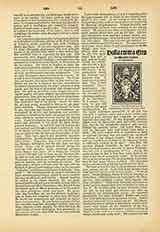

Leo II, Saint, POPE (682-83), date of birth unknown; d. June 28, 683. He was a Sicilian, and son of one Paul. Though elected pope a few days after the death of St. Agatho (January 10, 681), he was not consecrated till after the lapse of a year and seven months (August 17, 682). Under Leo’s predecessor St. Agatho, negotiations had been opened between the Holy See and Emperor Constantine Pogonatus concerning the relations of the Byzantine Court to papal elections. Constantine had already promised Agatho to abolish or reduce the tax which for about a century the popes had had to pay to the imperial treasury on the occasion of their consecration, and under Leo’s successor he made other changes in what had hitherto been required of the Roman Church at the time of a papal election. In all probability, therefore, it was continued correspondence on this matter which caused the delay of the imperial confirmation of Leo’s election, and hence the long postponement of his consecration. The most important act accomplished by Leo in his short pontificate was his confirmation of the acts of the Sixth Ecumenical Council (680-1). This council had been held in Constantinople against the Monothelites, and had been presided over by the legates of Pope Agatho. After Leo had notified the emperor that the decrees of the council had been confirmed by him, he proceeded to make them known to the nations of the West. The letters which he sent for this end to the king and to the bishops and nobles of Spain have come down to us. In them he explained what the council had effected, and he called upon the bishops to subscribe to its decrees. At the same time he was at pains to make it clear that in condemning his predecessor Honorius I, he did so, not because he taught heresy, but because he was not active enough in opposing it. In accordance with the papal mandate, a synod was held at Toledo (684) in which the Council of Constantinople was accepted.
The fact that Ravenna had long been the residence of the emperors or of their representatives, the exarchs, had awakened the ambition of its archbishops. They aspired to the privileges of patriarchs and desired to be autocephalous, i, e. free from the direct jurisdiction of the pope, considered as their primate. As they could not succeed in inducing the popes to agree to their wishes, they attempted to secure their accomplishment by an imperial decree recognizing them as autocephalous. But this did not prove sufficient to enable the archbishops to effect their purpose, and Leo obtained from Constantine Pogonatus the revocation of the edict of Constans. On his side, however, Leo abolished the tax which the archbishops had been accustomed to pay when they received the pallium. And though he insisted that the archbishops-elect must come to Rome to be consecrated, he consented to the arrangement that they should not be obliged to remain in Rome more than eight days at the time of their consecration, and that, while they were not to be bound to come again to Rome themselves in order to offer their homage to the pope, they were each year to send a delegate to do so in their name. Perhaps because he feared that the Lombards might again ravage the catacombs, Leo transferred thence many of the relics of the martyrs into a church which he built to receive them. This pope, who is called by his contemporary biographer both just and learned, is commemorated as a saint in the Roman Martyrology on June 28.
HORACE K. MANN

